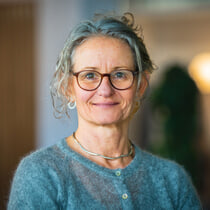Research and Development
Researchers from UCL’s faculties apply their knowhow to developing new insights and solutions to real life challenges. From the treatment of dementia and dealing with inequality and vulnerability in health and social care, to digital media in teaching, robotics and innovative food processing.
Researchers at UCL are under the obligation to teach, thus contributing to a research-based curriculum and promoting student involvement in research.
Applied Research Centres
The Health Sciences Research Centre creates and disseminates knowledge based on the research programme: ‘Working in close cooperation with end users in the Health Service of the future’.
The research programme contributes to the development and improvement of the health services and to all services offered by the welfare society.
Research is conducted across the boundaries of sectors and professions, in close collaboration with universities, hospitals, private businesses, public administration and fellow university colleges in Denmark and abroad.
The resulting scientific facts fuel future health-related degree courses and study programmes challenged by constantly changing conditions.
Applied Research, Education and Social Sciences works closely with schools, day care centres and study programmes in education and social education, in order to generate new knowledge relevant to practice and study programmes.
Among our many fields of interest are the following:
- Learning materials, curricula and technology
- Food, body and movement
- Digitalisation, general education and critical thinking
- Play, creativity and opportunities for inclusion
- Project didactics and exploratory teaching methods
- Health promotion in educational practice
- Taste and aesthetic forms of activity
- Active citizenship and democratic education
- Understanding technology, reading and media habits
- Reading, writing and multimodal authoring
Researchers cross disciplinary boundaries to collaborate with professionals and scientists from research institutions across the world, creating insights of immediate and future value to the professions in question.
HistoryLab
The National Centre of Excellence for the Dissemination of History and Cultural Heritage, also known as HistoryLab, holds a special position in the field of research, working to strengthen the dissemination of history and cultural heritage to children and young people.
The centre further works to promote the dissemination of history and cultural heritage in day care, education, museums and visitor experience centres, as well as generally in Danish culture and media.
Applied Welfare Research does research and contributes knowledge about the opportunities and challenges presented by the welfare society, in terms of the general population, the professions and welfare institutions.
Research focuses on current key issues in practice, in which the professions, end users, administrative bodies, technologies and mechanisms of inclusion and exclusion form a complex pattern of interactions.
The Centre’s researchers collaborate closely with practitioners to formulate and design research projects, resulting in knowledge perceived as relevant and directly applicable to practice.
Applied research in Business and Technology is a multi-disciplinary centre that organises and conducts research within a range of different areas such as industrial digitalisation, innovation and entrepreneurship, digital marketing, sustainability and green transformation.
We participate in industrial collaborations and develop specific areas of e.g. SMEs’ businesses and processes.
The aim is to contribute to assess and implement new knowledge to improve knowledge and skill levels in industries. Further, we aim to connect real life business cases and innovation issues in our classrooms to improve our students’ understanding of the relationship between industry experience and new knowledge.





